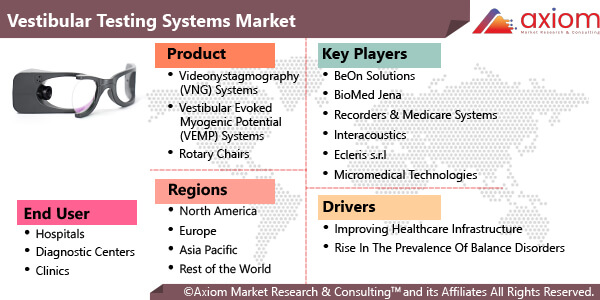Vestibular testing system is a sensory method of testing orientation and the coordination of the person. The vestibular testing system consists of a variety of tests that aid in the diagnosis of problems with the vestibular component of the inner ear. Furthermore, these examinations help to identify the symptoms of dizziness that can be treated later. Vestibular testing is performed on people who have balance issues. Vestibular tests are a testing method that are used to diagnose malfunctions or disorders in the vestibular part of the inner ear. These tests are used to see if dizziness and other neurological problems in people are caused by the brain, or if they are caused by medical issues like low blood pressure or psychological issues like anxiety.
Market Dynamic- Global Vestibular Testing Systems Market
The major factor propelling the market demand is improving healthcare infrastructure and rise in the prevalence of balance disorders. The vestibular tests are often needed for persons who have vertigo, balance problems, disequilibrium, benign paroxysmal positional vertigo (BPPV), or a concussion. The vestibular testing system plays a significant role for reducing the vertigo and dizzy symptoms, further enhance gaze stability, and reduce the danger of falling. For instance, in the United States, the number of children with vestibular problems is currently rising. Also, hearing tests are required for children in many areas, but vestibular system testing is not. As a result, vestibular disorders remain undetected, resulting in balance concerns, developmental or growth delays, and dizziness. The paediatric vestibular rehabilitation therapy programme at the Newport-Mesa Audiology, Balance & Ear Institute in California aids in the treatment of vestibular dysfunction symptoms. Thereby, the market is expected to have rising opportunities for market owing to rise in cases of balance disorders with emerging healthcare facilities.
COVID 19 Impact on Global Vestibular Testing Systems Market Report
The exclusive COVID 19 impact analysis report by Axiom MRC provides a 360 degree analysis of micro and macro-economic factors on the vestibular testing systems market. In addition, complete analysis of changes on the digital surgery market expenditure, economic and international policies on supply and demand side. The report also studies the impact of pandemic on global economies, international trade, business investments, GDP and marketing strategies of key players present in the market.
As the COVID-19 epidemic spreads, the focus on the pharmaceutical industries and employees' health and safety is increasing. COVID-19 pandemic has disturb the global healthcare system and disrupted the necessary supply chain of drug and medicine. It has negatively impacted on vestibular testing system market. Only medical supplies and life support product industries were permitted due to lockdown and other restriction. This hampered the vestibular testing system market. Pandemic decreased the market growth and with few key market players operating during the pandemic.
Vestibular Testing Systems Market Segmental Overview
Global Vestibular Testing Systems Market is analysed based on product, end user and geography.
Vestibular Testing Systems Market by product
By product, Vestibular Testing Systems Market is segmented into Videonystagmography (VNG) Systems, Vestibular Evoked Myogenic Potential (VEMP) Systems, Rotary Chairs, Computerized Dynamic Posturography. The Videonystagmography (VNG) Systems is expected to be the leading segment in vestibular system market during the forecast period. Adding to that Videonystagmography (VNG) Systems mostly refers to same test battery run using goggles with video cameras to monitor the eyes. The video camera and electrodes further measure the eye movement to evaluate signs of vestibular dysfunction or neurological problems further supporting in diagnosing vestibular disorders. Furthermore, increasing adopting of VNG system for vestibular testing due to its low cost and ease of use which is expected to growth of vestibular testing market. Likewise, Vestibular Evoked Myogenic Potential (VEMP) Systems, followed by Rotary Chairs, Computerized Dynamic Posturography are likely to contribute healthy growth in the market during the estimated time period.
Vestibular Testing Systems Market by End User
By end user, Vestibular Testing Systems Market is segmented into Hospitals, Diagnostic Centers and Clinics. The hospital segment is expected to account relatively high revenue share in the vestibular testing system market due to developing hospital infrastructure and increasing preference for the hospital treatment. These factors are responsible to growth of vestibular testing systems market
Vestibular Testing Systems Market by Geography
In terms of region, the Vestibular Testing Systems Market is studied for the key regions including North America, Europe, Asia Pacific, and Rest of the World. North America emerged as a dominant region for the industry and it’s expected to grow further during forecast period. Vertigo sickness is becoming more common, and the number of patients suffering from balance disorders is increasing. The global vestibular testing system market is being driven by an increase in the use of medicinal treatments for dizziness and/or inner ear disorders, as well as increased healthcare spending, greater awareness, and technical developments. Furthermore, one of the major factors driving demand for vestibular testing equipment in testing institutions is the growing geriatric population including hospitals and private clinics. In elder population the prevalence of vertigo and dizziness has reached up to 30% which reflect the rapid increase in the number of patients. It has huge impact on increasing the vestibular testing systems market.
Key Players in Vestibular Testing Systems Market
The key competitors of this market include BeOn Solutions, BioMed Jena, Recorders & Medicare Systems, Interacoustics, Ecleris s.r.l, Micromedical Technologies, Natus Medical Incorporated, Techno Concept, Balanceback, Difra, Vesticon Inc., Happersberger Otopront GmbH, Homoth Medizinelektronik GmbH & Co., Medi-Care Solutions s.r.l, Nagashima Medical Instruments. Co. Ltd., Otometrics A/S.
Recent Developments
June 2018: Interacoustics A/S launched a new Micromedical Orion Rotary Chair for enhanced vestibular assessment.











